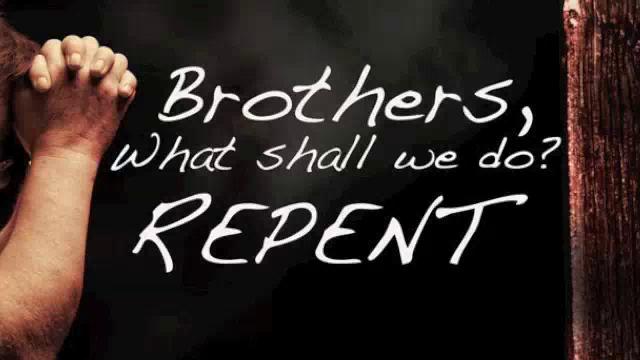“…know for certain that God has made Him both Lord and Christ-this Jesus whom you crucified.” Acts 2:36 Arguably one of the strongest invitations ever given, but notice the reaction by the men and women who heard Peter’s message on the Day of Pentecost. “Now when they heard this, they were pierced to the heart…” Pierced to the heart would mean they were touched to the core. They felt grief and strong emotion. Read again the message in Acts 2:14-42 concerning Christ’s death, burial and resurrection (the good news). The gospel message so impacted the listener that they were pierced, cut, pricked, stung in their hearts to make a change. However you translate it, in the early hours of the morning on this day of Pentecost, the people in Jerusalem were convicted in their hearts.
But consider another sermon from the book of Acts that was convicting to the listeners. Peter and the apostles were before the Council and giving their ‘defense’ when they stated, “The God of our fathers raised up Jesus, whom you had put to death by hanging Him on a cross. He is the one whom God exalted to His right hand as a Prince and a Savior, to grant repentance to Israel, and forgiveness of sins…” Acts 5:30, 31 In similar wording, Peter offers yet another stirring ‘invitation’ and again the listeners are ‘convicted’ in their hearts. In scripture we read that, “…when they heard this, they were cut to the quick…” No emotional pull from the listener here. There is no grief for a wrong done, but instead, there is an anger swelling up in these ‘convicted hearts.’
In Acts 2:37, when the people in Jerusalem heard Peter’s message and were ‘pierced to the heart’, they came back with the question, “Brethren, what shall we do?” In Acts 5:33 when the Council heard these similar words, “…they  intended to kill them (the apostles).” How can two sets of people hear the same message of salvation, feel a strong conviction and yet respond with entirely opposite views? Clearly one was convicted to accept a change while the other was convicted to reject change. For those who know a wrong exists in their lives, God provides an avenue. Peter’s response,“Repent, and let each of you be baptized in the name of Jesus Christ for the forgiveness of your sins…” (vs. 38). However, as he stood before the Council, when their hearts were ‘cut’, they sought to eliminate the source of their conviction.
intended to kill them (the apostles).” How can two sets of people hear the same message of salvation, feel a strong conviction and yet respond with entirely opposite views? Clearly one was convicted to accept a change while the other was convicted to reject change. For those who know a wrong exists in their lives, God provides an avenue. Peter’s response,“Repent, and let each of you be baptized in the name of Jesus Christ for the forgiveness of your sins…” (vs. 38). However, as he stood before the Council, when their hearts were ‘cut’, they sought to eliminate the source of their conviction.
Perhaps Paul’s first letter to the church in Corinth helps us understand how some might be convicted to change while others are convicted to rebel against God’s message. I Corinthians 1:23 read, “…but we preach Christ crucified, to Jews a stumbling block, and to Gentiles foolishness, but to those who are called (to those who are asking ‘what must I do to be saved’), both Jews and Greeks, Christ (is) the power of God and the wisdom of God.” So perhaps the question for you and me is simply, when we are convicted of a wrong, when our heart is pierced or pricked, how will we respond?

